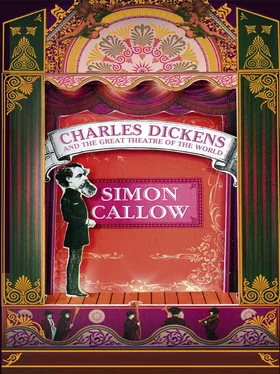John’s salary had been steadily rising to a very comfortable £230 per annum, so their next move, eighteen months later, was to leafy Southsea, in a roomy house with a nice little front garden; it represented a distinct step up the social ladder for them. There they were joined by the latest and newest young Dickens, Alfred, and Elizabeth’s much-loved sister, Mary, nicknamed Aunt Fanny, whose husband had died in action at sea. By now, the tide of the war had decisively turned for Napoleon, who was defeated and exiled in April 1814: good news for the world, but not for Portsmouth, and certainly not for John Dickens, who was called back to London in January 1815, thus losing his Outpost Allowance, and suffering a substantial reduction of salary to £200. It was the first major financial setback in a lifetime of increasing pecuniary embarrassment.
The family, now reduced in size after the loss of little Alfred from hydrocephalus (water on the brain), found its first London address in Norfolk Street, now Cleveland Street, just off the Marylebone Road in Fitzrovia – a good bustling area: it was within toddling distance of two great institutions, the Theatre of Variety and the workhouse. They were the alpha and omega of the young Charles Dickens’s life, heaven and hell in the same street. Just round the corner from Norfolk Street lived John’s mother, Elizabeth Dickens Sr, now retired from domestic service. Visits to her, according to Dickens’s lightly disguised accounts forty-five years later, were intimidating affairs, with none of the cosy under-stairs storytelling in which her employers’ children had so delighted. The ‘grim and unsympathetic old personage of the female gender, flavoured with musty dry lavender, dressed in black crape … with a fishy eye [and] an aquiline nose’ certainly held him spellbound, but the tales she span for him were of serial killers with missing ears and people slaughtered and turned into pies. Even getting a present from this ‘adamantine woman’ was an alarming event. On one occasion she took him to the World of Toys, shaking him on the way, from time to time, and insisting on wiping his nose herself ‘on the screw principle’. When they got to the bazaar, he was told to choose a present for half a crown; finally he settled on a Harlequin Wand. It proved to be a disappointment, however: it had no effect whatever on the rocking horse; it failed to produce a live clown out of the beefsteak pie at supper; and could not even influence the mind of his parents ‘to the extent of suggesting the decency and propriety of their giving me an invitation to sit up at dinner’. In time, he would amply make up for this first disappointing performance as a magician.
An even greater mystery was why his far from indulgent grandma had given him a present at all. For many years, he says, he was unable ‘to excogitate the reason’. At last he got it: ‘I have now no doubt she had done something bad in her youth, and that she took me out as an act of expiation.’
Charles was three at the beginning of his first metropolitan sojourn, and five when it ended. It seems that at some point during their time in Norfolk Street, John had been obliged to borrow money from his mother (in her will she mentions having given him advances); he must have been very glad, one way and another, to be transferred away from London to Sheerness in Kent, restored to his former salary, or rather better, a whopping £289 per annum.
In Sheerness it seems they lived in the racy Blue-town district, which had the immeasurable attraction of being the location of a thriving theatre; it is reported that the Dickenses’ house was so close to it that they could overhear the shows in their front room. The theatre was in Victory Street, and victory was very much in the air: performances habitually ended with rousing choruses of ‘Rule Britannia’ and ‘God Save the King’, which presumably echoed round their parlour. But the days of Sheerness’s theatre were numbered: it was pulled down to make way for an expansion of the dockyards, and, on the crest of this wave of expansion, John Dickens was transferred again, this time to Chatham, the ‘wickedest place in the world’, according to a fellow naval clerk. Wicked it may have been – as any self-respecting town with an itinerant population of soldiers and sailors was in honour bound to be – but it was the scene of incomparably the happiest days of Charles Dickens’s life. Here he lived for five years, between the ages of five and ten; here he immersed himself in nature; here he learned first his alphabet, then the rudiments of English and Latin, at his mother’s knee; here he had his first – very nearly his only – formal education, initially at a Dame’s school, and then at the hands of the local Nonconformist Minister’s highly qualified son, William Giles, freshly down from Oxford. From here he was taken to see his first plays; here he discovered the Aladdin’s Cave of his father’s modest library; here he and his sister sang their little songs, shepherded by their father, at the Mitre Hotel, which was run by family friends; here he was admired and approved of, encouraged and rewarded; here he was loved; here his inner life was everywhere richly nourished, and the matrix of his imagination set.
He was, at first, a sickly child, subject to spasms and incapable of active exertions; a lucky circumstance, he always said, because it pushed him to read while his contemporaries were throwing themselves around the sports field. While they ran about, he sat there, on his bed, he said, reading, ‘as if for life’. ‘Oh, he was a terrible boy to read,’ said Mary Weller. The books in his father’s little library were the great picaresque English novels of the eighteenth century – Roderick Random, Peregrine Pickle, Humphrey Clinker, Tom Jones – with their witty, thrustful, middle-class heroes outwitting a gallery of rogues and rivals; Robinson Crusoe and Don Quixote (not ALL of Don Quixote, surely?); and Gil Blas (Smollett à la française). There were collections of essays from Joseph Addison’s great eighteenth-century magazines, The Tatler and The Spectator; and then there were two books of immeasurable delight which entered deep into his imagination: The Arabian Nights and the Collected Farces of the eighteenth-century actress and playwright, Elizabeth Inchbald (these last read over and over again). All rather grown-up stuff, some of it quite risqué, but ‘whatever harm was in some of them, was not there for me; I knew nothing of it.’
His visits to the theatre, the little Theatre Royal at Rochester, were undertaken under the aegis of a young lodger, James Lamert – the son of Aunt Fanny’s new husband – who had taken warmly to the bright, odd, intense little boy. These excursions brought to living, breathing reality the visions he had already encountered between the covers of his books. He was wildly excited by what he saw; the world of the theatre, its mysteries and its absurdities had seized him by the throat:
Many wondrous secrets of Nature did I come to the knowledge of in that sanctuary: of which not the least terrific were, that the witches in Macbeth bore an awful resemblance to the Thane and other proper inhabitants of Scotland; and that the good King Duncan couldn’t rest in his grave, but was constantly coming out of it and calling himself somebody else.
Once home, he demanded that the kitchen be cleared so that he and the little boy next door could act out scenes from the plays they’d just seen; he then sat down and knocked off Misnar, Sultan of India: A Tragedy, his literary début, as far as we know; after its short run in the kitchen in Chatham, it disappeared. Later, on two consecutive Christmases, he was taken up to London to see the greatest clown of the age, Joey Grimaldi. Best of all was the invitation to sit in on rehearsals of the amateur productions staged by his friend Lamert: the making of theatre became a passion for the eight-year-old boy, a passion that would endure till very nearly the day he died.
Читать дальше












